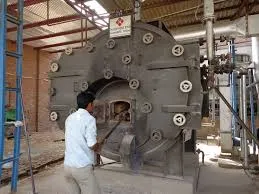
Oct . 31, 2024 21:39 Back to list
Thermal Fluid Heating Systems for Efficient Boiler Performance and Energy Savings
Understanding Thermal Fluid Boilers A Comprehensive Overview
Thermal fluid boilers are essential components in various industrial processes where heat transfer is crucial. Unlike traditional steam boilers, these systems use a thermally stable liquid as a heat transfer medium. This article delves into the working principles, applications, advantages, and maintenance considerations of thermal fluid boilers.
Working Principles
Thermal fluid boilers operate on the principle of circulating a heated thermal fluid — typically oil or synthetic fluids — through a closed-loop system. The process begins when the boiler heats the fluid to a specific temperature, which can reach up to 400°C (752°F) or higher, depending on the fluid used. The heated thermal fluid is then circulated through heat exchangers, where it transfers heat to various applications such as reactors, dryers, and heating processes.
One of the key advantages of these systems is their ability to operate at high temperatures without generating excessive pressure. This characteristic significantly reduces the risk of safety hazards associated with high-pressure steam systems, making thermal fluid boilers safer to operate.
Applications
Thermal fluid boilers find applications in various industries, including food processing, chemical manufacturing, oil and gas, plastics, and textiles. In food processing, they are used for applications like frying, cooking, and drying, where precise temperature control is essential. The chemical industry utilizes thermal fluid boilers for reactions that require consistent heating, while the oil and gas sector uses them for thermal enhanced oil recovery techniques.
Moreover, thermal fluid systems are becoming increasingly popular in renewable energy applications, such as solar thermal plants, where they can efficiently store and transfer heat generated from solar collectors.
Advantages
thermal fluid boiler

There are several advantages to using thermal fluid boilers over traditional steam boilers
1. Efficiency Thermal fluid systems operate at higher temperatures without the need for high pressure, leading to improved heat transfer efficiency. 2. Flexibility They can easily adapt to varying heating loads, making them suitable for processes that demand changeable thermal requirements.
3. Safety With lower pressure operations, the risk of catastrophic failures is minimized, enhancing workplace safety.
4. Environmental Impact Many thermal fluids are designed to be environmentally friendly, minimizing emissions and making them compliant with regulatory standards.
Maintenance Considerations
To ensure the efficient operation of a thermal fluid boiler, regular maintenance is critical. This includes monitoring the fluid's condition, checking for leaks, and ensuring that the heat transfer surfaces are clean and free from deposits. It is also essential to maintain optimal fluid levels and to ensure that the circulation pumps are functioning correctly.
Periodic thermal fluid analysis can help detect any degradation or contamination, which can prevent significant breakdowns and extend the lifespan of the boiler. Additionally, staff training in the operation and troubleshooting of thermal fluid systems is vital for maintaining efficiency and safety.
Conclusion
In summary, thermal fluid boilers play a vital role in modern industrial applications, offering an efficient, flexible, and safe method of heat transfer. Their ability to operate at high temperatures without high pressure makes them a preferred choice for many industries, ensuring that processes run smoothly and efficiently. By understanding their workings, advantages, and maintenance needs, industries can leverage these systems to enhance productivity while minimizing risks.
-
High-Efficiency Gas Thermal Oil Boilers | HPT Models
NewsJul.31,2025
-
Oil Fired Hot Water Boilers Sale - High Efficiency & Affordable
NewsJul.31,2025
-
High-Efficiency Commercial Oil Fired Steam Boiler for Industry
NewsJul.30,2025
-
High-Efficiency Biomass Fired Thermal Oil Boiler Solutions
NewsJul.30,2025
-
High Efficiency Gas Fired Thermal Oil Boiler for Industrial Heating
NewsJul.29,2025
-
High-Efficiency Gas Fired Hot Water Boiler for Sale – Reliable & Affordable
NewsJul.29,2025
Related PRODUCTS






















